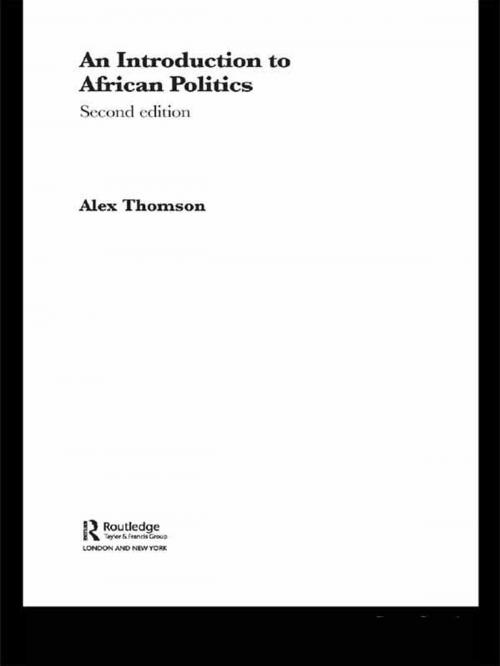| Author: | Alex Thomson | ISBN: | 9781134458325 |
| Publisher: | Taylor and Francis | Publication: | February 28, 2005 |
| Imprint: | Routledge | Language: | English |
| Author: | Alex Thomson |
| ISBN: | 9781134458325 |
| Publisher: | Taylor and Francis |
| Publication: | February 28, 2005 |
| Imprint: | Routledge |
| Language: | English |
An Introduction to African Politics is the ideal textbook for those new to the study of this vast and fascinating continent. It makes sense of the diverse political systems that are a feature of Africa by using familiar concepts, chapter by chapter, to examine the continent as a whole. The result is a textbook that identifies the essential features of African politics, allowing students to grasp the recurring political patterns that have dominated this part of the world since independence.
Features and benefits of the book include:
* thematically organised, with individual chapters exploring issues such as colonialism, ethnicity, nationalism, social class, ideology, legitimacy, sovereignty, and democracy
* identifies the key recurrent theme of competitive relationships between the African state, its civil society, and external interests
* contains useful boxed case studies of key countries at the end of each chapter, including: Kenya; Tanzania; Nigeria; Botswana; Ivory Coast; Uganda; Somalia; Ghana; Zaire; and Algeria
* each chapter concludes with key terms and definitions as well as questions, advice on further reading, and useful notes and references
* clearly and accessibly written by an experienced teacher of the subject.
An Introduction to African Politics is the ideal textbook for those new to the study of this vast and fascinating continent. It makes sense of the diverse political systems that are a feature of Africa by using familiar concepts, chapter by chapter, to examine the continent as a whole. The result is a textbook that identifies the essential features of African politics, allowing students to grasp the recurring political patterns that have dominated this part of the world since independence.
Features and benefits of the book include:
* thematically organised, with individual chapters exploring issues such as colonialism, ethnicity, nationalism, social class, ideology, legitimacy, sovereignty, and democracy
* identifies the key recurrent theme of competitive relationships between the African state, its civil society, and external interests
* contains useful boxed case studies of key countries at the end of each chapter, including: Kenya; Tanzania; Nigeria; Botswana; Ivory Coast; Uganda; Somalia; Ghana; Zaire; and Algeria
* each chapter concludes with key terms and definitions as well as questions, advice on further reading, and useful notes and references
* clearly and accessibly written by an experienced teacher of the subject.















